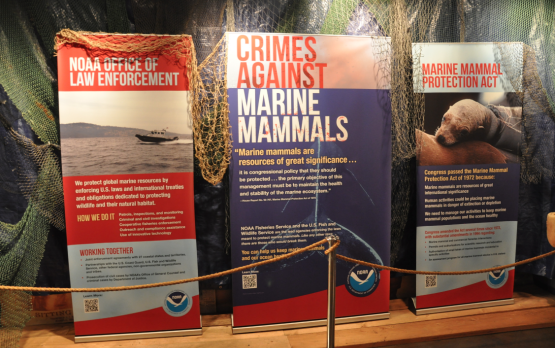Crimes Against Marine Mammals
May 24, 2012
By Mera McGrew
On Tuesday, the National Oceanic and Atmospheric Administration (NOAA) unveiled a unique exhibit at the Crime Museum in Washington D.C., Crimes Against Marine Mammals.
The temporary exhibit, which runs until September 3, details specific violations of the Marine Mammal Protection Act and offers insight into how law enforcement agents investigate those violations.
“Through the artifacts NOAA brought in for their temporary exhibit, visitors of the museum can learn more about what the issues are and how to prevent them,” explained Crime Museum COO, Janine Vaccarello. “Many people are unaware of how prevalent violence against marine mammals is, even here in the United States.”
The exhibit was organized as part of the 40th anniversary of the Marine Mammal Protection Act, which was signed into law in 1972. The Act protects all marine mammals by prohibiting the harassment, hunting, collecting, killing or capture of marine mammals in U.S. waters or by U.S. citizens on the high seas. The Act also bans the importation of marine mammals and marine mammal products into the U.S.
The Crime Museum exhibit offers a unique way to bring awareness to the Act and show the public different ways to prevent violations and protect marine mammals. “Combining photos and stories with actual artifacts in an exhibit reaches people in a way that a press release or poster may not,” said Jonathan Shannon from NOAA Fisheries Office of Protected Resources.
The exhibit introduces museum-goers to the Marine Mammal Protection Act through the closed cases of a fatal monk seal shooting in 2009 and a sperm whale teeth trafficking case from 2011. More generally, the exhibit highlights that crimes aren’t just committed against humans; crimes can also be committed against marine mammals.
Visitors leave the exhibit, Crimes Against Marine Mammals, more aware and with a feeling of hope — we can all help. We can make a difference by being informed consumers, viewing wildlife responsibly, and informing NOAA if we observe of a violation of the Marine Mammal Protection Act.







